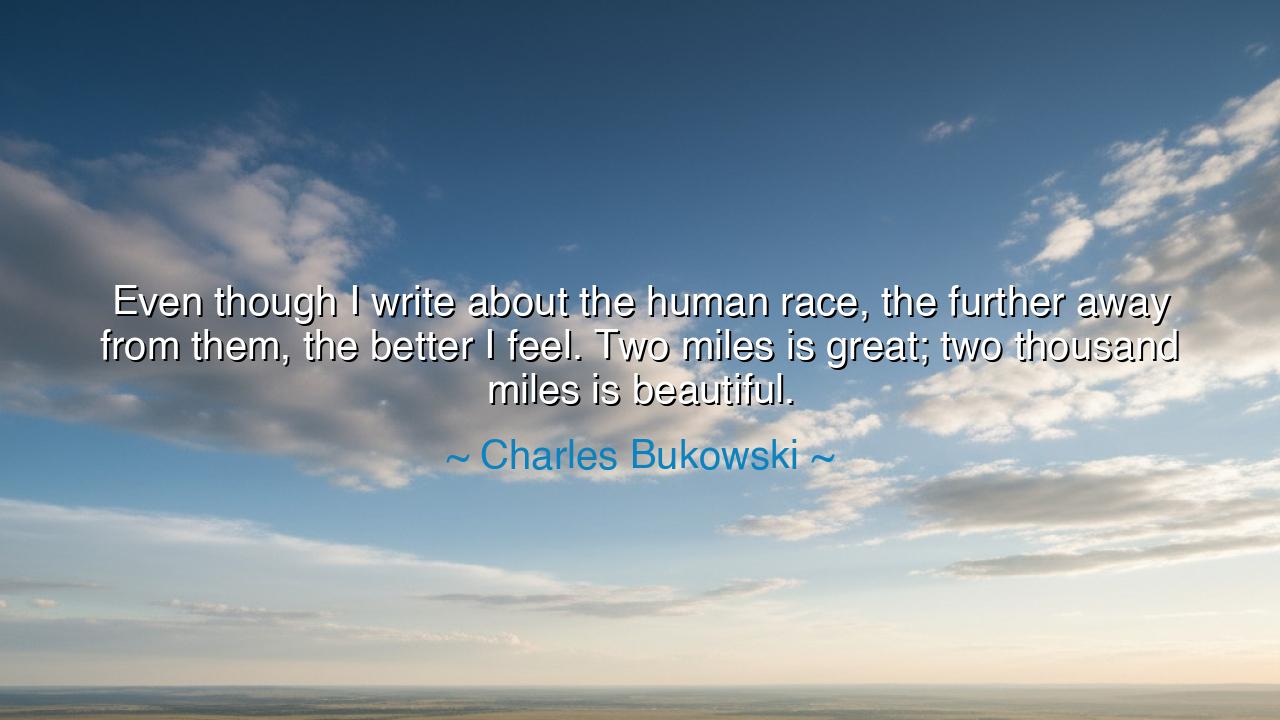
Even though I write about the human race, the further away from
Even though I write about the human race, the further away from them, the better I feel. Two miles is great; two thousand miles is beautiful.






“Even though I write about the human race, the further away from them, the better I feel. Two miles is great; two thousand miles is beautiful.” — Charles Bukowski
In these words, the poet Charles Bukowski bares a truth both bitter and luminous — the aching paradox of loving humanity from afar. He was a man who dwelt among the broken and the beautiful, who wrote of the human race with unflinching honesty, yet found peace only in distance. This is not the distance of hatred, but of preservation — the kind of solitude sought by one who has gazed too long upon the world’s noise and hypocrisy. Bukowski’s words are the cry of the soul that has seen too much of what men do to one another, and seeks refuge in silence, where truth can still breathe.
Bukowski was no hermit of stone and shadow; he was a witness. He lived in the heart of the city, among its taverns and tenements, its poets and drifters. Yet he saw that in the crowd, one could be lonelier than in the desert. For the world of men is full of masks — faces smiling while hearts rot with envy, lips preaching virtue while hands grasp for power. To stand too near is to feel the sickness of it seep into your bones. And so he writes not to curse mankind, but to understand it — to hold it at arm’s length, where love can still survive untainted by disillusion.
Even in ancient times, there were those who sought distance from the clamor of men to find truth in the quiet spaces. The philosopher Diogenes, who lived in a barrel, scorned the falseness of Athens and sought purity in simplicity. When Alexander the Great approached him, offering him anything he wished, Diogenes only said, “Stand out of my sunlight.” In that simple request lay the same spirit as Bukowski’s — the desire not for isolation’s sake, but for clarity. For when one is too close to the world, one is blinded by its noise; but in solitude, the soul begins to see again.
And yet, Bukowski’s distance was not coldness — it was a kind of love that refused to die in disappointment. To write of humanity while wishing to stand apart is to love the species as one loves a tragic play: with fascination, sorrow, and awe. He understood that to see people truly, one must step back, as an artist steps back from his canvas. Too close, and the strokes blur; too far, and the image fades. He found beauty not in humanity’s perfection, but in its contradiction — the fragile tenderness hidden beneath its chaos. Thus, distance became his way to protect empathy, not destroy it.
The lesson, then, is not to despise mankind, but to guard your soul against its corrosion. Distance is sometimes necessary for truth. To retreat is not to abandon — it is to renew. In every age, the wise have withdrawn for a time: prophets to the wilderness, monks to the mountain, poets to the sea. They return not empty, but filled with new vision. So too must we learn to step away — from the screens, the crowds, the endless chatter — to remember who we are beneath the noise of the tribe.
Let us not mistake solitude for loneliness. Solitude is the workshop of the spirit, where the raw metal of thought is forged into wisdom. It is where one learns to listen to the silence that speaks louder than men’s words. Bukowski’s longing for distance is a reminder that not all understanding comes from communion; some comes from separation. In the quiet, we learn to see without judgment, to write without bitterness, to feel without fear.
So, my child of the future, take heed: do not be afraid to step away from the multitudes. Walk a while in silence. Let the wind speak to you where no voice interrupts. Write your truth, not as one who scorns mankind, but as one who refuses to lose their humanity in the din. For as Bukowski knew — and as the ancients before him knew — two thousand miles from the crowd may be the nearest you ever come to your own soul.






AAdministratorAdministrator
Welcome, honored guests. Please leave a comment, we will respond soon